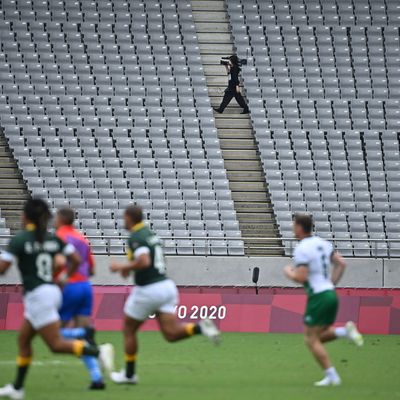
The Olympics are nearing their final bow, and while there have been plenty of thrilling moments over the past two weeks, it feels in some ways like these Games never quite hit exit velocity — at least not for those watching on American television. I talked to Vulture TV critic Jen Chaney about why that is.
Ben: This has been a very weird Olympics in so many ways, from the grim drumbeat of rising COVID cases in Japan to the empty stands to Simone Biles’s unexpected withdrawal from most events. Perhaps as a result of some or all of these factors, viewership on NBC is way down from 2016 (streaming numbers make up for only a small percentage of that shortfall). How have you found the overall experience of watching these atypical Games?
Jen: I have found that it requires more work than usual, and I am not sure if that’s a me thing — i.e., the pandemic made me less motivated — but I don’t think it’s just that.
NBC has utilized all of its networks and platforms during recent Olympics past, but the Peacock and NBC Sports app of it all, not to mention the 13-hour time difference, makes me feel like I have to really go out of my way to figure out when the events I was interested in watching could be seen. At a certain point, that got fatiguing. Also, it doesn’t feel like people have been talking about the Games much, so the word of mouth is at a lower level, which points back to what you just said about the decline in viewership. It’s like the Olympics are happening but they’re background noise somehow.
Ben: I had the same feeling, though I’ve been on vacation for some of this time, so I couldn’t tell to what extent that was just my perception. Do you think the lack of the watercooler factor, so to speak, has to do with the pandemic’s cloud over the whole thing?Another thing is that there hasn’t been one singular athlete to captivate everyone the way there has been in previous games, with Michael Phelps or Usain Bolt. Biles has been endlessly covered, of course, but for not participating.
Jen: Yes, I think the lack of a singular draw — Olympic star power, if you will — is part of it. Biles was meant to be that draw, and as you said, she generated a lot of meaningful conversation, but not the kind that makes people tune in to the Games. The women’s soccer team would have been another draw, but their early loss diluted the buzz around them a bit. I was trying to think before we started this conversation: Has there been a single meme generated by these Olympics? I cannot think of one. I think it hurts, too, that these Olympics have come to us through the Olympic equivalent of a virtual void. Normally, Olympics coverage involved sending reporters out to see the sites and highlight the culture of the host city. With COVID, NBC could not do that. So while some outdoor events allowed viewers to see some scenery, a lot of it — gymnastics, swimming, basketball — could have been coming to us from literally anywhere. There was no “there” there.
Ben: Yeah, which is a real shame because Tokyo, and Japan in general, is so ripe for good television, and it’s totally squandered. It doesn’t help, I’m sure, that most Japanese people were not at all enthusiastic about the Games even happening. There’s a sense of “Well, we’re getting this over with because we have to” here, it seems.
Jen: Definitely. And I do not blame them!
The long-term question, at least from a TV-viewing standpoint, is whether the lack of interest in the Games this year is an anomaly or another movement in the trend away from mass-viewing experiences, especially on broadcast television. I think it’s impossible right now to know whether the next Olympics will pique more interest.
Ben: TV ratings for almost all sports fell during 2020, even with so many people stuck at home. They’ve rebounded in some sports in the last few months, but not in others. One change between those two periods is that stands in American sports are no longer empty, as they were at the height of the pandemic. I do wonder if people view spectatorless sporting events as somehow off-brand versions of the real thing, to such a degree that they’ll skip out on watching.
Jen: That definitely could have been a factor too. I also think the non-live issue was a big one for prime time. The 13-hour time difference is, in some ways, better than a seven-hour one. At least some of the swimming and other events actually could be seen live on NBC during the nightly broadcast. But so much of it was on in the middle of the night East Coast time, and when you got up, the results were already out there. Again: This is not a new problem. But with more people now accustomed to avoiding broadcast experience, there may have been more viewing clips online and calling it a day.
Ben: Separate from the ratings/lack-of-interest issue: A lot of times, Olympic coverage in this country is accused of being too jingoistic — focusing on American stories only while reducing the other athletes mostly to background noise. (Of course, nationalism is kind of the name of the game here, but sometimes this reaches parodic levels.) How do you think NBC has done on this front?
Jen: As always, the emphasis has tended to be on American competitors, but I also feel like some of the more memorable moments of these Olympics involved athletes from other countries. That’s probably less about NBC than it is about the message the athletes themselves were sending. One of the nicest stories was the high jumpers from Italy and Qatar who shared the gold medal, although I don’t know how much time that got on the traditional NBC broadcast. I mostly saw and read about it online. But I would say in general, it felt less blatantly jingoistic than usual. I mean, a number of American teams and athletes got humbled (women’s soccer, men’s basketball when they lost to France), and I think that factored into the more low-key attitude than usual. And honestly, that’s probably a good thing? America could stand to be humbled.





























